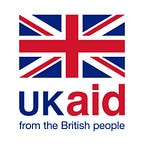Facing the future
Forced into marriage at 15, Sena from Zambia recalls her past and why she’s looking ahead with hope
“My dream is to have my own business and build a better home for my child so I save whatever money I can. Working towards this goal makes me happy.”
~ Sena ~
Seventeen-year-old Sena lives and works in Zambia. Like most young women, she is looking to build a better future for herself and her family. She is mother to two-year-old Samuel and earns a living working in a shop selling vegetables in her village. Despite her young age, she has already been through a lot. Sena was forced into marriage when she got pregnant at 15. Without help from her family she had no alternative but to drop out of school.
“My father whipped me and chased me out of the house when I got pregnant. I was forced to marry the father of the child. I tried to go home but my father wouldn’t take me back. Life was very hard for me.”
~ Sena ~
For girls like Sena, early marriage marks a premature end to their education and a move away from the safety of family and friends. They also face an increased risk of STDs, and physical and sexual violence.
“I was rushed into marriage. If I had completed my education I could have been a better person today, going to college and doing better things.”
~ Sena ~
“Our marriage is very difficult. My husband and I have constant arguments. I regret getting married so early, there’s nothing good in it.”~ Sena ~
Worldwide, more than 700 million women alive today were married as children. In Zambia, where Sena lives, 2 out of every 5 girls get married before their 18th birthday.
Girls like Sena, who live in poor, rural areas are most likely to be married young. Economic hardship, lack of education, early pregnancy and the low value of girls in society drive the harmful practice.
For Sena, life began to look a little more hopeful when she started attending UK aid supported safe space sessions run by the Population Council.
The programme involves weekly girls-only group meetings with a mentor who provides training on health, HIV, life skills and financial education. Sena and her friends are also given a voucher for health services and a girl-friendly savings account.
The safe spaces help develop the girls’ self-confidence, as well as support their education and health care.
“Before it was difficult for me to save money but now I am better at managing my finances. The lessons I learn at the safe spaces have improved my marriage. I’m able to talk to my husband and explain things without getting into an argument.”~ Sena ~
Meet Juliet. She mentors three groups, including the group which Sena attends.
As well as teaching the girls valuable life skills she also acts as their confidante, encouraging her mentees to open up to her with any problems they may have.
The passion she has for her job — and her belief in the girls she mentors — is clear.
“I feel very good about the group meetings and I don’t miss a single session. If I have any problems or issues I’m able to speak to my mentor Juliet and get her advice.” ~ Sena ~
We believe that child marriage can end within a generation. The UK aid supported ‘safe space’ programme is currently helping more than 10,000 vulnerable adolescent girls benefit from safe spaces in Zambia. And the UK has recently approved a new £36 million programme to accelerate action to end child marriage in 12 of the world’s worst affected countries.
One in 3 girls in the developing world is married by the age of 18, and one in 9 is married by the age of 15.
The safe space sessions are part of the Adolescent Girls Empowerment Programme (AGEP) which is run by the Population Council and funded by DFID. The programme is currently helping more than 10,000 girls benefit from safe spaces in Zambia. The work is carefully evaluated to see how it is changing girls’ lives.
DFID is scaling up national efforts to end child marriage in Zambia, one of 12 countries, in a new Global Programme we are supporting through UNICEF and UNFPA — supported jointly with the governments of Canada and the Netherlands.
Pictures and interviews: Sheena Ariyapala & Jessica Lea for the Department for International Development.
